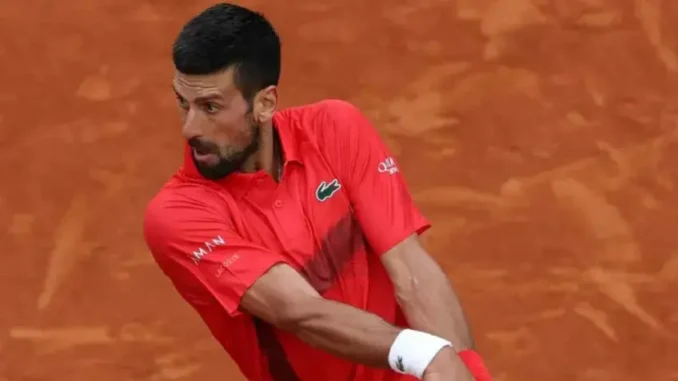
In the electric atmosphere of Roland Garros, where the clay courts pulse with the dreams of tennis glory, Novak Djokovic, the three-time French Open champion, is grappling with more than just his opponents. As the 2025 tournament progresses, the 38-year-old Serbian star has expressed mounting frustration with the tournament’s scheduling, particularly the late-night slot assigned to his third-round match against qualifier Filip Misolic on Saturday, May 31. Set to take place not before 8:15 p.m. on Court Philippe-Chatrier, the timing has reignited Djokovic’s concerns about the physical and mental toll of playing deep into the Parisian night.
Djokovic, currently ranked No. 6 and chasing a record-breaking 25th Grand Slam title, is no stranger to the demands of high-stakes tennis. Fresh off a commanding 6-3, 6-2, 7-6(1) victory over Frenchman Corentin Moutet in the second round, he showcased his resilience, saving a set point in the third set to maintain his perfect 12-0 record against French players at Roland Garros. Yet, the prospect of another late-night battle has left him visibly displeased. “Mentally, I had to stay concentrated and prepared for a match like that,” Djokovic said, reflecting on his intense match against Moutet’s tricky drop shots and crowd-fueled energy. “Corentin is a player who has great speed, it was a great battle, especially the third set. I saved a set point… At that moment, anything is possible.” His ability to stay composed under pressure is undeniable, but the late scheduling threatens to test even his champion’s mentality.
The issue of late-night matches is a recurring one at Roland Garros, where the night session, introduced in 2021, has often favored men’s matches, sparking debates about fairness and player welfare. Djokovic’s Saturday clash, following a day session featuring stars like Coco Gauff, Jessica Pegula, and Alexander Zverev, is slated to start at a time that could push the match past midnight—a scenario he’s faced before. Last year, his epic five-set battle against Lorenzo Musetti ended at 3:06 a.m., a grueling affair that left him gesturing to the crowd for more energy as he fought back from two sets to one down. “The world No. 1 produces the best game he’s played for some time to grab the first break in the fourth set,” observers noted of that match, highlighting Djokovic’s ability to summon greatness under fatigue. Yet, he’s made it clear that such late finishes are far from ideal.
Djokovic’s frustration stems not only from the physical demands but also from the broader context of his season. After a rocky start on clay, with early exits in Monte Carlo and Madrid, his decision to play the Geneva Open last week proved pivotal. The wildcard entry yielded his 100th career title, a milestone that boosted his confidence. “I think it was a good move to go to Geneva because I was struggling a little bit with my confidence level, doubting my game a bit,” he admitted. “Coming into Roland Garros, it feels different than I had compared to the feeling I had three weeks ago.” That newfound momentum has carried him through his opening rounds, but the late-night slot risks disrupting his rhythm as he faces a tough road ahead, with potential clashes against Alexander Zverev, Jannik Sinner, or defending champion Carlos Alcaraz looming.
The scheduling debate also touches on equity, echoing recent complaints from players like Coco Gauff and Ons Jabeur about the lack of women’s matches in prime-time slots. Djokovic, while not directly addressing this, has long advocated for player welfare, and his current discontent underscores the need for a balanced approach. As he prepares to face the 23-year-old Misolic, a rising Austrian ranked No. 153, Djokovic knows the stakes are high. Misolic, who stunned Hubert Hurkacz in the first round, represents a fresh challenge, but Djokovic’s experience and 21-0 first-round record at Roland Garros make him the favorite. Still, the late hour adds an extra layer of difficulty.
As the Parisian crowd gears up for another thrilling night on Chatrier, Djokovic’s pursuit of history continues. His focus remains razor-sharp, but his call for better scheduling resonates as a plea for fairness in a sport that demands everything from its stars. With the men’s final set for June 8, the tennis world watches to see if Djokovic can overcome both his opponents and the clock to claim his 25th major title.
Leave a Reply